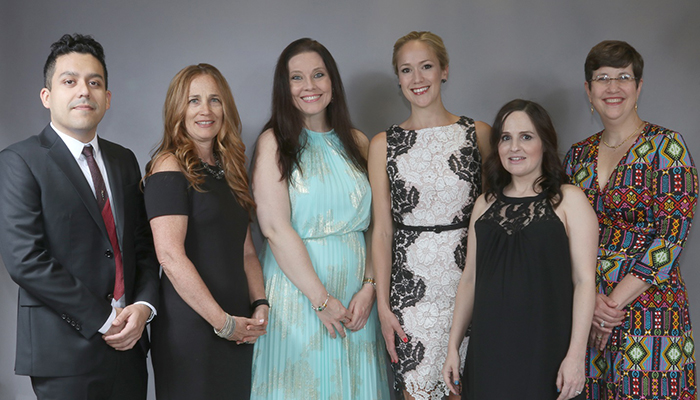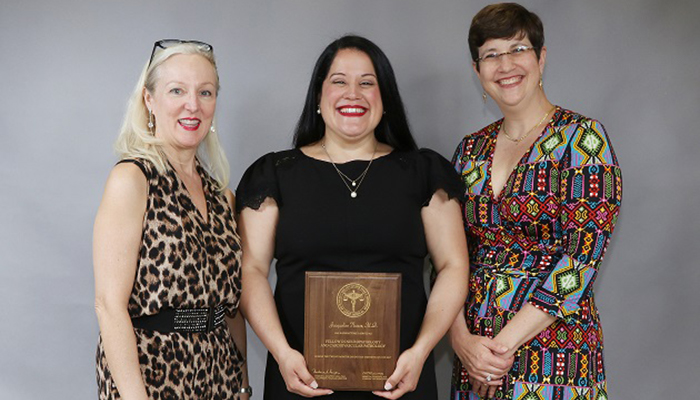
 Office of Chief Medical Examiner311
Office of Chief Medical Examiner311 Search all NYC.gov websites
Search all NYC.gov websites
OCME Marks Graduation of Forensic Pathology Fellows
Five physicians complete rigorous training as country grapples with epidemic of opioid overdose deaths and shortage of medical examiners


June 22, 2017
New York, NY – The New York City Office of Chief Medical Examiner (OCME) today marked the conclusion of the 2016-2017 Forensic Pathology Fellows Training Program by recognizing five new graduates who will work at the intersection of medicine and law to help address some of the nation's most pressing public health challenges.
This latest class of OCME Forensic Pathology Fellows brings the total number of program graduates to 104, representing one-fifth of the approximately 500 board-certified forensic pathologists in the United States. Graduates of the program over the past two decades include current and former chief medical examiners in more than 20 jurisdictions, including New York City, and medical examiners currently serving throughout the country.
"The OCME Forensic Pathology Fellows Training Program stands at the core of our agency's mission to assist families and communities affected by profound and sudden loss," said New York City Chief Medical Examiner Dr. Barbara Sampson, a 1999 graduate of the program. "With our alumni leading offices from Maine to Hawaii, OCME makes a national impact on the field of forensic pathology at a time when the public health system desperately needs professionals with this advanced training and knowledge."
The number of forensic pathologists currently practicing in the United States is estimated to be half the amount needed to serve the nation's criminal justice and public health systems. This need continues to grow with urgency as medical examiners' offices experience an increase in caseloads due to mounting overdose deaths from heroin and synthetic opioids such as fentanyl.
During the year-long intensive training program in New York City, Fellows investigate deaths throughout the five boroughs under the guidance of senior OCME medical examiners who comprise the Department of Forensic Medicine at the NYU School of Medicine. Fellows work with specialized OCME departments including the DNA laboratory and forensic anthropology department, and receive training in court testimony and mass fatality management. All Fellows hold a Doctor of Medicine degree and have completed residency training in anatomic pathology and/or clinical pathology prior to the start of the Fellowship.
"Graduates of the class of 2016-2017 come from a variety of backgrounds, but all share the commitment to excellence and compassion for families that are the hallmarks of our program," said Fellowship Program Director Dr. Susan Ely, a 1998 graduate. "We congratulate these new medical examiners as they embark on this exciting field, supplying a critical service to communities."
The 2016-2017 graduates in Forensic Pathology include Dr. Terra Cederroth, Dr. Hannah Jarvis, Dr. Melissa Guzzetta, and Dr. Gene Maya. Dr. Jacqueline Nunez, a 2015-2016 graduate in Forensic Pathology, completed advanced training in Forensic Neuropathology with Dr. Rebecca Folkerth, OCME Neuropathologist, and in Cardiovascular Pathology with Chief Medical Examiner Dr. Sampson.
The OCME Forensic Pathology Fellows Training Program was established by the late Dr. Charles S. Hirsch, former chief medical examiner of New York City. Many graduates of the program continue to serve at OCME after completing their Fellowship, helping to insulate New York City from the shortage of medical examiners affecting other jurisdictions.
Established in 1918 as the first governmental agency of its type in the United States, OCME provides advanced services across the full range of forensic science disciplines. OCME operates the largest public crime DNA laboratory in North America, in addition to laboratories in toxicology, histology, and the nation's only public molecular genetics laboratory. The agency is home to the country's largest forensic pathology training program, which has trained more board-certified forensic pathologists than any other program. OCME also houses a department of forensic anthropology, and maintains a division of specially trained experts to respond to any and all fatality events, no matter what hazards may be encountered during recovery.
For more information, please contact the OCME Public Affairs Office at 212-447-2041.


